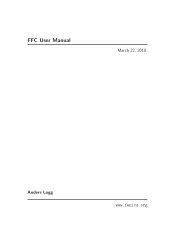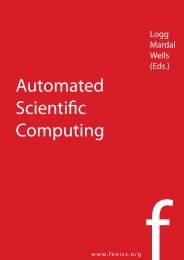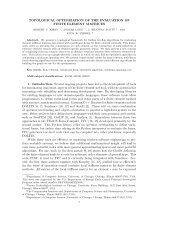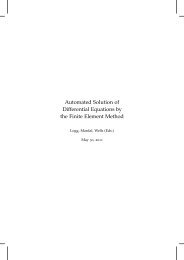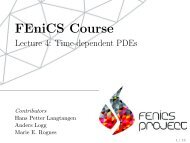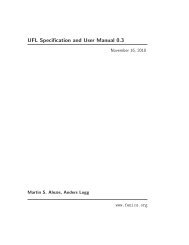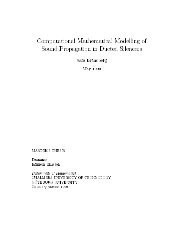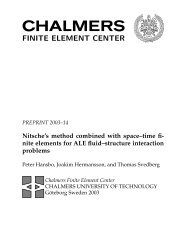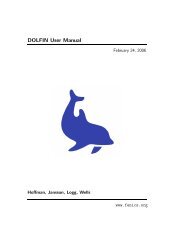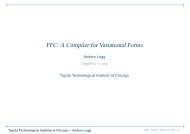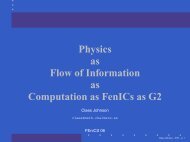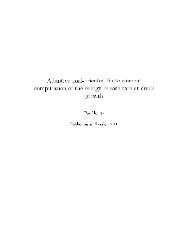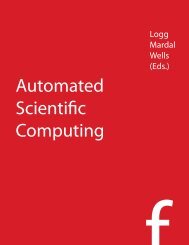Efficient compilation of complex tensor algebra ... - FEniCS Project
Efficient compilation of complex tensor algebra ... - FEniCS Project
Efficient compilation of complex tensor algebra ... - FEniCS Project
You also want an ePaper? Increase the reach of your titles
YUMPU automatically turns print PDFs into web optimized ePapers that Google loves.
<strong>Efficient</strong> <strong>compilation</strong> <strong>of</strong> <strong>complex</strong><br />
<strong>tensor</strong> <strong>algebra</strong> expressions<br />
Martin Sandve Alnæs<br />
Center for Biomedical Computing<br />
June 5th, <strong>FEniCS</strong> 2012
UFL is a DSL, symbolic backend,<br />
and frontend to form compilers<br />
• Users recently reported scalabiliy problems<br />
when compiling complicated equations<br />
• After some pr<strong>of</strong>iling sessions I reduced the<br />
memory usage by a factor 10 for one case<br />
• Next I have made an attempt at faster form<br />
compiler algorithms, which I will show
UFL expressions are represented<br />
in a symbolic expression tree<br />
IntValue<br />
CellVolume<br />
Coefficient<br />
ListTensor<br />
Dot<br />
e = dot(as_vector((1, cell.volume)),<br />
Coefficient(V))
Some quick design<br />
points<br />
• Expr objects are immutable for easy sharing<br />
• Conservative approach to automatic<br />
simplifications<br />
• Canonical ordering <strong>of</strong> sum and product:<br />
a*b<br />
a*b<br />
b*a<br />
a*b
UFL simplifies some<br />
expressions on construction<br />
1*f f<br />
0*f 0<br />
0 + f f<br />
op(c1)<br />
c2
Simplifications critical during<br />
differentiation algorithm<br />
as_<strong>tensor</strong>(A[i,j], (i,j))<br />
A<br />
• d/dx( x * g(y) ) = 1 * g + x * 0 -> g
Performance must scale as<br />
O(n) with size <strong>of</strong> expression<br />
• This means almost anything must be O(1)<br />
• In particular __eq__ and __hash__!
Transformations must be safe<br />
for floating point computations<br />
• Def eps: 1 + eps > 1<br />
• (1 + eps/2) + eps/2 == 1<br />
• 1 + (eps/2 + eps/2) > 1
I will take this expression<br />
through the compiler algorithms<br />
a, b, c = scalar coefficients<br />
u = as_vector((0, a, b))<br />
v = as_vector((c, b, a))<br />
e = dot(u, v)<br />
Anticipate result:<br />
t = a*b<br />
e = t + t
The expression tree after<br />
translating dot to index notation<br />
Zero<br />
Coefficient a<br />
Coefficient c<br />
ListTensor<br />
Coefficient b<br />
ListTensor<br />
Indexed<br />
Index<br />
Product<br />
Indexed<br />
IndexSum
Placing nodes in array<br />
Index V[i] Shape Size<br />
0 0 () + () 1<br />
1 a () + () 1<br />
2 b () + () 1<br />
3 c () + () 1<br />
4 (3,) + () 3<br />
5 (3,) + () 3<br />
6 u[i] () + (3,) 3<br />
7 v[i] () + (3,) 3<br />
8 u[i]*v[i] () + (3,) 3<br />
9 ISum(V[8],i) () + () 1
Scalar subexpressions are<br />
assigned unique value numbers<br />
Index V[i] Value number<br />
0 0 0<br />
1 a 1<br />
2 b 2<br />
3 c 3<br />
4 0,1,2<br />
5 3,2,1<br />
6 u[i] 0,1,2<br />
7 v[i] 3,2,1<br />
8 u[i]*v[i] 4,5,6<br />
9 ISum(V[8],i) 7
Scalar subexpressions are<br />
reevaluated and placed in a new array<br />
Index S[i] Simplifies to<br />
0 0<br />
1 a<br />
2 b<br />
3 c<br />
4 S[0]*S[3] 0*c = 0<br />
5 S[0]*S[3] a*b<br />
6 S[0]*S[3] b*a = a*b<br />
7 S[4]+S[5]+S[6] a*b + a*b
Throwing away the array only<br />
keeping the final expression<br />
a*b + a*b
Placing nodes in array!<br />
Index V[i] Shape Size<br />
0 a () + () 1<br />
1 b () + () 1<br />
2 a*b () + () 1<br />
3 a*b + a*b () + () 1
Analyzing dependencies<br />
Index V[i] Dep. Rev. Dep.<br />
0 a () (2,)<br />
1 b () (2,)<br />
2 a*b (0,1) (3,3)<br />
3 a*b + a*b (2,2) ()
Final steps in compiler<br />
• Partition final array by dependencies on x,u,v<br />
• Heuristically pick best candidates for subexpressions<br />
to place in intermediate variables in generated code<br />
• Format expressions and assignment statements within<br />
nested loops<br />
• FEM library specific code generation in separate<br />
plugin class, e.g. how to evaluate geometry and<br />
coefficients, how to loop over quadrature points and<br />
basis functions
Outlook<br />
• bzr branch lp:uflacs<br />
• Can generate dolfin::Expression classes<br />
• Soon SFC can use uflacs to compile forms<br />
• Want to merge algorithms into FFC<br />
• Write plugin class to compile to other FEM libs



